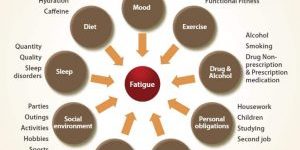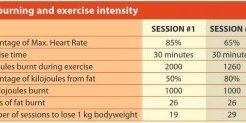When should I sleep?
What are the best methods to improve sleep quality during menopause?
Many women report disturbed sleep during perimenopause and menopause. This often includes difficulty falling or staying asleep and waking through the night or very early in the morning. There are……
What can you do to manage fatigue?
Taking action against fatigue happens in two forms: 1) the action you take when you experience fatigue; and 2) the action you take to prevent fatigue and therefore become more……
Sleep Disorders
It is estimated that 6% of the population suffer from sleep disorders. Sleep disorders may make some health conditions worse such as, heartburn, depression, asthma and heart disease. Sleep disorders……
Anxiety and fatigue
While the symptoms of anxiety disorders change with the specific diagnosis, the common theme is an overwhelming sense of worry and the associated lack of concentration, feeling tired and irritable.……
How hard do I need to exercise to burn fat?
This is probably one of the most common questions people ask about exercise and weight loss; and the most poorly understood. The answer to this question comes down to the……
I don’t have enough time to exercise?
I am too busy at work and my work hours are too long. Despite advances in technology, many of us still spend more – rather than less – time at……
Getting enough exercise
We’ve talked about all the benefits of physical activity, but how do we know your fitness is causing you to lack energy and feel fatigued? Ask yourself these questions: Do……
Why is fatigue a problem?
The consequences of fatigue are unpredictable. They can range in severity and should not be taken lightly. The simple act of falling asleep may result in something as harmless as……
Smoking and sleep
Nicotine can hamper a person’s ability to fall asleep or get good quality sleep. Studies have shown that the average smoker gets 30 minutes less sleep compared to non-smokers. Trouble……
Mental illness. Causes and treatments
Causes of mood disorders The cause of stress, anxiety or depression is often difficult to determine and is usually a combination of social, situational and personal factors. Social factors may……










